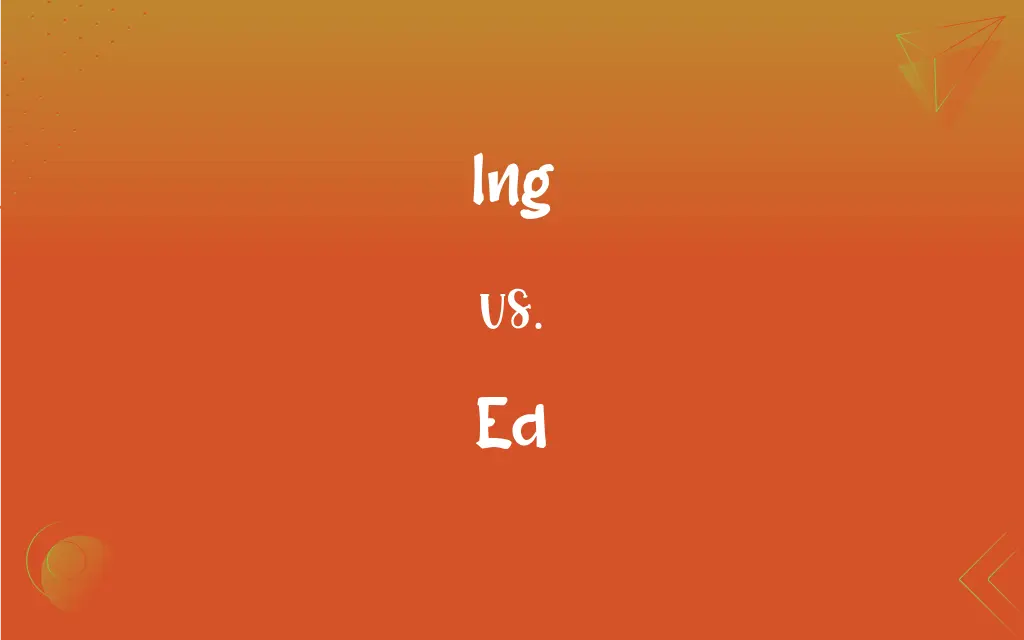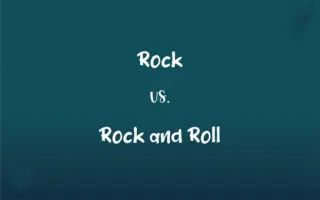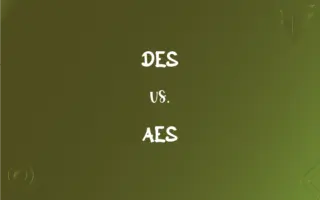Ing vs. Ed: What's the Difference?
Edited by Harlon Moss || By Janet White || Published on February 20, 2024
"Ing" signifies ongoing action or state; "ed" indicates completed action or state.

Key Differences
The "ing" form, or gerund, is used to denote continuous or progressive aspects in verbs, implying ongoing action (e.g., "running"). The "ed" form, typically a past tense marker, signifies completed actions or states (e.g., "walked").
"Ing" is also used in present participles, which can function as adjectives or form progressive tenses (e.g., "The shining sun"). "Ed" in its past participle form can also serve as an adjective or create perfect tenses (e.g., "The closed door").
Using "ing" often implies that the action is in the process or yet to be completed (e.g., "She is singing"). In contrast, "ed" implies that the action has been completed in the past (e.g., "She danced gracefully").
Verbs with "ing" often pair with auxiliary verbs like "is," "am," "are," "was," or "were" (e.g., "He is going"). "Ed" verbs usually do not require an auxiliary verb in simple past but do in perfect tenses (e.g., "He had played").
When used as adjectives, "ing" words describe something causing a feeling (e.g., "a boring lecture"), while "ed" words describe how someone feels (e.g., "She felt bored during the lecture").
ADVERTISEMENT
Comparison Chart
Verb Tense
Continuous/Progressive
Past/Perfect
Action State
Ongoing/Unfinished
Completed/Finished
Auxiliary Verbs
Often used with "is," "are"
Used with "had," "did" in perfect tenses
Adjective Use
Describes causing a feeling
Describes feeling or state
Example
Running, Singing
Walked, Laughed
ADVERTISEMENT
Ing and Ed Definitions
Ing
"Ing" forms gerunds, which act as nouns.
Swimming is my favorite hobby.
Ed
"Ed" can make adjectives from verbs.
She was tired after the journey.
Ing
"Ing" indicates an ongoing action or process.
The bird is singing beautifully.
Ed
"Ed" indicates a completed action or state.
The door was locked.
Ing
"Ing" verbs describe continuous states in the present.
She is studying for her exams.
Ed
"Ed" often marks the simple past tense of verbs.
He walked to the store.
Ing
"Ing" is used in present participles.
The sun is shining brightly.
Ed
"Ed" forms past participles used in perfect tenses.
She has cooked dinner.
Ing
"Ing" can turn verbs into adjectives.
The howling wind kept me awake.
Ed
"Ed" in adjectives can describe feelings.
He felt amazed by the show.
Ing
A meadow, especially a low meadow near a river; water meadow.
Ings, glens, and fens of the Highlands.
Ed
Education
Driver's ed.
Adult ed.
Ing
The letter for the ng sound lang=en in Pitman shorthand.
Ed
Edition
Ing
A pasture or meadow; generally one lying low, near a river.
Ed
Editor
Ed
Education uncountable
Ed
Impotence resulting from a man's inability to have or maintain an erection of his penis
FAQs
What does "ing" indicate in verbs?
It indicates ongoing or continuous action.
Can "ing" be used to form nouns?
Yes, as gerunds, which are verb forms acting as nouns.
What is the primary use of "ed" in verbs?
It marks completed actions, typically in the past tense.
Are "ing" verbs used with auxiliary verbs?
Yes, especially with forms of "to be" in continuous tenses.
Do "ed" verbs always need auxiliary verbs?
Not in the simple past, but they do in perfect tenses.
Is "ed" used in active or passive voice?
It can be used in both, especially in past participles.
Can "ing" form adjectives?
Yes, often describing something causing a feeling or state.
How does "ed" form past participles?
It is added to verbs to form past participles, used in perfect tenses.
What is a present participle?
A verb form ending in "ing" used in continuous tenses or as an adjective.
Is "ed" used in irregular verbs?
Yes, though the past form may not always end in "ed."
Does "ing" imply future action?
Not directly, but it can be used in contexts implying future action.
How does context affect "ed" usage?
Context determines whether it's past tense or a past participle.
Can "ing" change the meaning of a verb?
It can change the aspect, indicating an ongoing process.
Can "ed" indicate a conditional mood?
Yes, particularly in conditional sentences.
How does "ing" affect verb tense?
It creates a progressive or continuous aspect of the verb.
What role does "ed" play in regular verbs?
It typically forms the simple past tense.
Is "ing" used in all verb forms?
No, only in certain tenses and as gerunds or adjectives.
Are there exceptions to "ing" rules?
Yes, especially in spelling changes for certain verbs.
Can "ed" be used in compound verb tenses?
Yes, particularly in perfect and passive constructions.
Do "ed" adjectives have a specific function?
They often describe feelings or states resulting from an action.
About Author
Written by
Janet WhiteJanet White has been an esteemed writer and blogger for Difference Wiki. Holding a Master's degree in Science and Medical Journalism from the prestigious Boston University, she has consistently demonstrated her expertise and passion for her field. When she's not immersed in her work, Janet relishes her time exercising, delving into a good book, and cherishing moments with friends and family.
Edited by
Harlon MossHarlon is a seasoned quality moderator and accomplished content writer for Difference Wiki. An alumnus of the prestigious University of California, he earned his degree in Computer Science. Leveraging his academic background, Harlon brings a meticulous and informed perspective to his work, ensuring content accuracy and excellence.































































